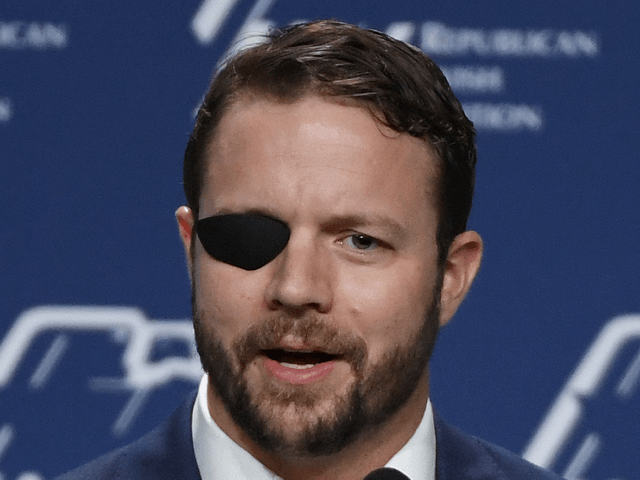“Maybe college kids will go to school next year and laugh at the idea of microaggressions, because maybe they actually lived through something difficult lately,” said Rep. Dan Crenshaw (R-TX), speculating on a possible improvement among post-secondary students’ attitudes following the eventual end of the coronavirus pandemic.
In an interview on SiriusXM’s Breitbart News Sunday with host Joel Pollak, Crenshaw, a retired Navy SEAL and author of Fortitude: American Resilience in the Era of Outrage, considered the development of resilience through adversity.
Pollak said, “You wrote this book about the breakdown of America’s ability to deal with difficulty,” adding, “It’s a hard lesson to learn, but it’s something you’ve got to teach your kids.”
Left-wing fetishization of illusory grievances weakens one’s capacity to persevere through difficulty, warned Crenshaw.
“I didn’t write this book for coronavirus, but there are lots of applicable lessons to the virus, and this confrontation with risk and risk acceptance,” Crenshaw said. “I note in the book how worried I am to see this trend about outrage culture, and the obsession with being offended, and microaggressions. I worry that the current population could never deal with something truly difficult, and I make note of that in the book.”
Crenshaw added, “We actually are encountering something quite difficult right now. Some people are encountering it on the public health side, most Americans are encountering that difficulty on the economic side.”
American grit is not well reflected in the nation’s political discourse, estimated Crenshaw.
“I still believe — I’m still optimistic — the American people ultimately, at the ground level, still engage with this enormous element of fortitude, perseverance, and resilience, but our public dialogue seems to be the opposite,” Crenshaw assessed. “It does seem fragile. It seems like we are hair-on-fire. It seems like you would think that [the coronavirus outbreak] is the most difficult thing that anybody has ever imagined, but of course, it isn’t, looking back in history with some perspective.”
Crenshaw stated, “I feel that the American psyche has become soft and fragile and I want us to be better.”
LISTEN:
Crenshaw said, “My overall assessment of it is, given what we knew at the time, I think we had to lock down. But we gave people a set of goals for that lockdown, which was to flatten the curve and save our hospital system, and those have been accomplished. So I really question the governors and local officials throughout the country who refuse to reopen their societies even after that attack.”
“That’s worrying to me, and it shows us that we misconstrue risk,” continued Crenshaw. “I think we’ll look back on this and say it took no courage whatsoever to tell people to stay locked in their homes. It actually took some courage to be honest with the American people about the risks we’re going to confront, and how we were going to do it, and if it ultimately was the right thing to do. Because you can’t pretend there’s no cost to shutting down the economy the way we’re doing.”
Crenshaw warned of self-defeatism through perceptions of helplessness and victimhood.
“One of the chapters in my book is called ‘The Stories We Tell Ourselves,’ and [it] is about engaging in suffering and hardship, but telling yourself the right story about that,” Crenshaw stated. “Sometimes you’re misconstruing hardship. Sometimes it’s really not hard at all. You think it is, but it’s not. Sometimes you’re a victim. Sometimes you’re actually not okay, but that’s irrelevant.
Crenshaw went on, “What is relevant is the story you tell yourself afterwards, how you confront that challenge, because you control the future. You do not control what happened, but you do control the future. We do need to tell ourselves the right story about whatever hardship that we’ve confronted, and we do have to tell that story as overcoming as opposed to a story of victimhood and helplessness.
Politicians “take advantage” of perceptions of victimhood and helplessness by trafficking in grievance and “emotional blackmail” to empower themselves, noted Crenshaw.
“Telling people that they’re oppressed [and] that only they can be saved by a politician and government gaining power over [them] is a story of disempowerment, and I think it’s the most immoral thing you can do to the American people,” determined Crenshaw.
The coronavirus pandemic may provide broader perspective to those fixated on trivial matters, estimated Crenshaw.
Crenshaw stated, “Maybe college kids will go to school next year and laugh at the idea of microaggressions, because maybe they actually lived through something difficult lately, and microaggressions [will] seem like an afterthought [and] seem silly. I would hope that perspective is now being embraced by college students.”
Breitbart News Sunday broadcasts live on SiriusXM Patriot 125 from 7:00 p.m. to 10:00 p.m. Eastern.
Follow Robert Kraychik on Twitter.

COMMENTS
Please let us know if you're having issues with commenting.